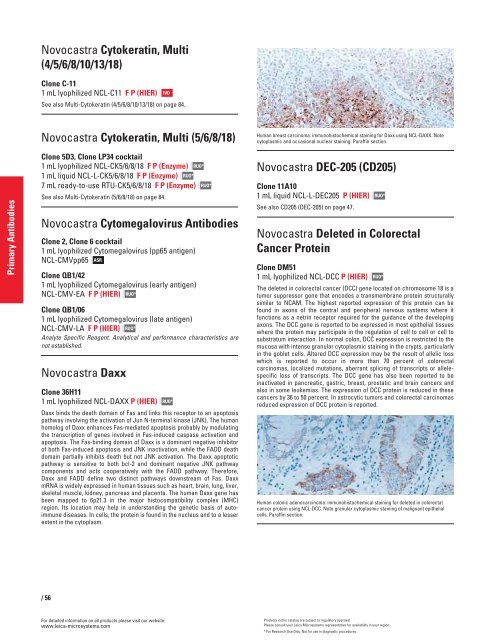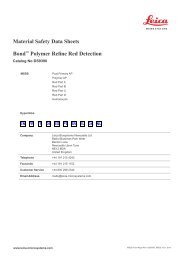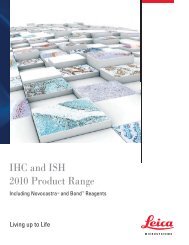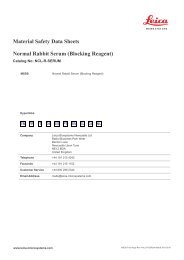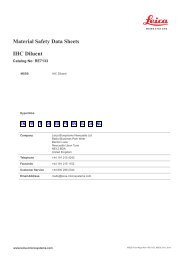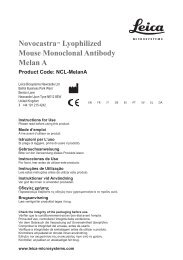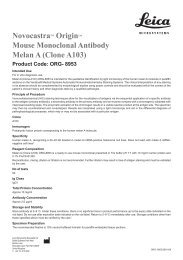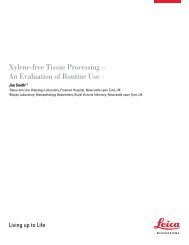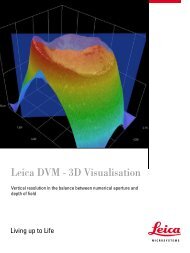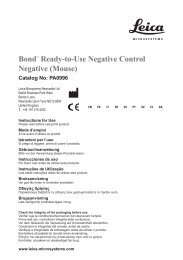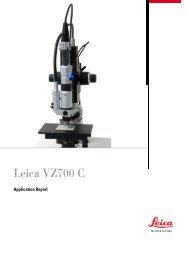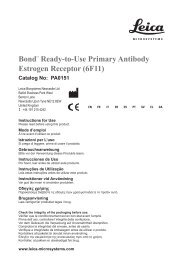QF0159 Marketing Release Record
QF0159 Marketing Release Record
QF0159 Marketing Release Record
You also want an ePaper? Increase the reach of your titles
YUMPU automatically turns print PDFs into web optimized ePapers that Google loves.
Primary Antibodies<br />
Novocastra Cytokeratin, Multi<br />
(4/5/6/8/10/13/18)<br />
Clone C-11<br />
1 mL lyophilized NCL-C11 F P (HIER)<br />
See also Multi-Cytokeratin (4/5/6/8/10/13/18) on page 84.<br />
Novocastra Cytokeratin, Multi (5/6/8/18)<br />
Clone 5D3, Clone LP34 cocktail<br />
1 mL lyophilized NCL-CK5/6/8/18 F P (Enzyme)<br />
1 mL liquid NCL-L-CK5/6/8/18 F P (Enzyme) RUO*<br />
7 mL ready-to-use RTU-CK5/6/8/18 F P (Enzyme)<br />
See also Multi-Cytokeratin (5/6/8/18) on page 84.<br />
Novocastra Cytomegalovirus Antibodies<br />
Clone 2, Clone 6 cocktail<br />
1 mL lyophilized Cytomegalovirus (pp65 antigen)<br />
NCL-CMVpp65 ASR<br />
Clone QB1/42<br />
1 mL lyophilized Cytomegalovirus (early antigen)<br />
NCL-CMV-EA F P (HIER) RUO*<br />
Clone QB1/06<br />
1 mL lyophilized Cytomegalovirus (late antigen)<br />
NCL-CMV-LA F P (HIER) RUO*<br />
Analyte Specific Reagent. Analytical and performance characteristics are<br />
not established.<br />
Novocastra Daxx<br />
Clone 36H11<br />
1 mL lyophilized NCL-DAXX P (HIER)<br />
Daxx binds the death domain of Fas and links this receptor to an apoptosis<br />
pathway involving the activation of Jun N-terminal kinase (JNK). The human<br />
homolog of Daxx enhances Fas-mediated apoptosis probably by modulating<br />
the transcription of genes involved in Fas-induced caspase activation and<br />
apoptosis. The Fas-binding domain of Daxx is a dominant negative inhibitor<br />
of both Fas-induced apoptosis and JNK inactivation, while the FADD death<br />
domain partially inhibits death but not JNK activation. The Daxx apoptotic<br />
pathway is sensitive to both bcl-2 and dominant negative JNK pathway<br />
components and acts cooperatively with the FADD pathway. Therefore,<br />
Daxx and FADD define two distinct pathways downstream of Fas. Daxx<br />
mRNA is widely expressed in human tissues such as heart, brain, lung, liver,<br />
skeletal muscle, kidney, pancreas and placenta. The human Daxx gene has<br />
been mapped to 6p21.3 in the major histocompatibility complex (MHC)<br />
region. Its location may help in understanding the genetic basis of autoimmune<br />
diseases. In cells, the protein is found in the nucleus and to a lesser<br />
extent in the cytoplasm.<br />
/56<br />
For detailed information on all products please visit our website:<br />
www.leica-microsystems.com<br />
IVD<br />
RUO*<br />
RUO*<br />
RUO*<br />
Human breast carcinoma: immunohistochemical staining for Daxx using NCL-DAXX. Note<br />
cytoplasmic and occasional nuclear staining. Paraffin section.<br />
Novocastra DEC-205 (CD205)<br />
Clone 11A10<br />
1 mL liquid NCL-L-DEC205 P (HIER)<br />
See also CD205 (DEC-205) on page 47.<br />
Novocastra Deleted in Colorectal<br />
Cancer Protein<br />
Clone DM51<br />
1 mL lyophilized NCL-DCC P (HIER)<br />
RUO*<br />
RUO*<br />
The deleted in colorectal cancer (DCC) gene located on chromosome 18 is a<br />
tumor suppressor gene that encodes a transmembrane protein structurally<br />
similar to NCAM. The highest reported expression of this protein can be<br />
found in axons of the central and peripheral nervous systems where it<br />
functions as a netrin receptor required for the guidance of the developing<br />
axons. The DCC gene is reported to be expressed in most epithelial tissues<br />
where the protein may participate in the regulation of cell to cell or cell to<br />
substratum interaction. In normal colon, DCC expression is restricted to the<br />
mucosa with intense granular cytoplasmic staining in the crypts, particularly<br />
in the goblet cells. Altered DCC expression may be the result of allelic loss<br />
which is reported to occur in more than 70 percent of colorectal<br />
carcinomas, localized mutations, aberrant splicing of transcripts or allelespecific<br />
loss of transcripts. The DCC gene has also been reported to be<br />
inactivated in pancreatic, gastric, breast, prostatic and brain cancers and<br />
also in some leukemias. The expression of DCC protein is reduced in these<br />
cancers by 36 to 50 percent. In astrocytic tumors and colorectal carcinomas<br />
reduced expression of DCC protein is reported.<br />
Human colonic adenocarcinoma: immunohistochemical staining for deleted in colorectal<br />
cancer protein using NCL-DCC. Note granular cytoplasmic staining of malignant epithelial<br />
cells. Paraffin section.<br />
Products in this catalog are subject to regulatory approval.<br />
Please consult your Leica Microsystems representative for availability in your region.<br />
* For Research Use Only. Not for use in diagnostic procedures.


